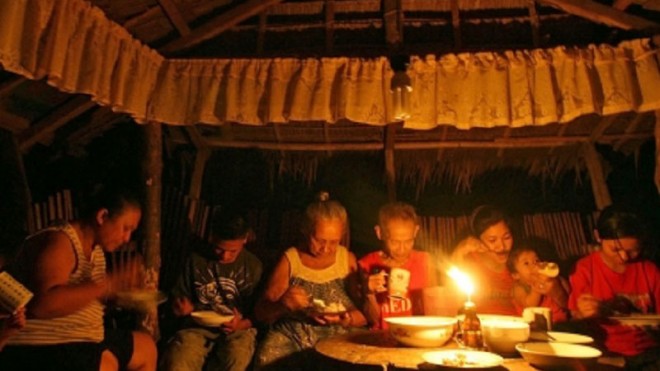
A family huddled around the table for a candle-lit dinner. Consumers may expect higher electricity bill due to the thinning power supply, according to the Department of Energy. INQUIRER FILE PHOTO
MANILA, Philippines — The dwindling power supply and the possible increase in power rates, compounded by the adverse effects of the COVID-19 pandemic could spell a “triple whammy” to disadvantaged Filipinos, Senator Grace Poe said Monday.
“The looming power rate increase coupled with the rotational brownouts in the midst of the coronavirus pandemic could be a triple whammy too much for our people’s forbearance,” Poe, chair of the Senate committee on public services, said in a statement.
Poe issued the statement as the Department of Energy warned that consumers in Luzon may expect higher electricity bills due to thin power supply.
In May, the overall rates of the Manila Electric Company also went up by 18.53 centavos per kilowatt-hour as generation charges increased amid tight supply in the Luzon grid.
Poe said that the need for enough electricity supply amid the COVID-19 pandemic “should have been anticipated” as evident factors including hot weather contribute to the increase in demand.
“That the heat, humidity and increased demand are straining electrical grids should have been anticipated and continuously addressed with a comprehensive energy program that will also look into the capabilities of private distributors and sources of power,” she said.
She also pointed out that access to reliable and affordable energy is necessary in addressing the pandemic and accelerating the country’s recovery.
According to the senator, the country cannot be “groping in the dark” amid blackouts as Filipinos adjust to living in the new normal under strict quarantine protocols.
“Why should the Filipino consumers pay more for electricity that comes intermittently and is among the highest rates in Southeast Asia?” Poe said.
Poe also noted that the proposed amendments to the Public Service Act (PSA) will lead to better services and lower cost of basic needs.
Senate Bill 2094 which seeks amendments to PSA aims to separate public utilities from public services to ramp up foreign investments, which is expected to increase competition to improve services and lower rates in the country.
The Senate energy committee recently called for an investigation on the rotational blackouts, stressing the need to hold the Department of Energy accountable for its “failure to address power supply shortages since 2016.” — Faith Yuen Wei Ragasa, Inquirer trainee
READ: Luzon brownouts hit some senators, logging them out of Senate session